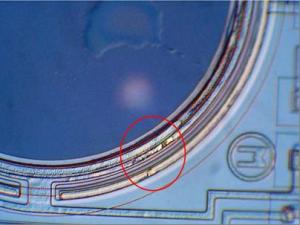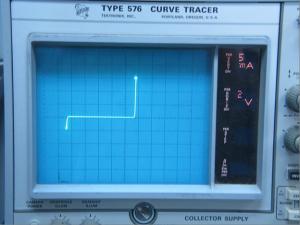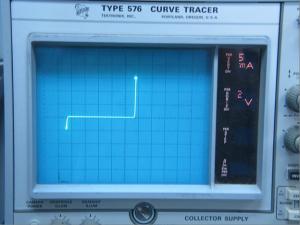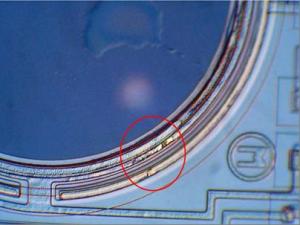Phototransistor Failure
Gideon Analytical Laboratories received a failed SFH 320 optocoupler in a dual S0-8 package for failure analysis. Optocouplers can be used in many applications, including phototransistor, phototriac, or photodarlington outputs, in a range of through-hole and surface-mount package types. Many are digital optocouplers are used in the automotive industry. They come in a variety of AC and DC configurations, have high noise immunity, and are high temp devices. Two functionally good optocouplers were supplied for comparison. The goal was to find the cause of the failure.
The optocoupler was electrically tested. The input diode showed a normal curve trace with a reverse breakdown voltage (BVR) 3-4 of 8.2 V. All diodes showed the same curve trace. There was no inversion or distortion in the curve trace suggesting a contamination or facet oxidation taking place or diminished output intensity. The VF was 1.5V. The leakage current was less than 5 na. The input capacitance was .23 pF. The curve trace of the short is shown in the picture above left.
The failure was baked out at 125C for two hours and retested electrically with no change. This is a hard failure. Pin 7 was unaffected by the bake out. Two packages were decapsulated to remove the epoxy. This was done to expose a known good optocoupler to the same process that the failure is exposed to during decapsulation. If any artifacts of decapsulation show up, it will be on both the good optos and the failure. Pictured above right, inside the red oval, is the guard ring around the photodiode which had seen excessive heat causing delamination of the metal. The heating was caused by excessive voltage.
Gideon Analytical Laboratories reached an important conclusion. The output on pin 7 gives a normal truth table. This die had no physical or manufacturing anomalies, which would suggest a component problem. This was also true of a functionally good optocoupler that was electrically tested, decapsulated and optically inspected as well. The failed optocoupler had evidence of excessive heat beyond the tolerance of the device’s rating. This excessive heating manifested itself in failed transistors, metal movement under the passivation, and disturbed trace lines for the circuitry interconnects.
Electronics companies that use Gideon Analytical Laboratories for failure analysis needs are provided with pertinent and accurate analytical results that can help them properly plan for future business.

Phototransistor breakdown on diffusion lines due to voltage

Curve trace of input diode

Curve trace of input diode

phototransistor-breakdown-on-diffusion-lines-due-to-voltage